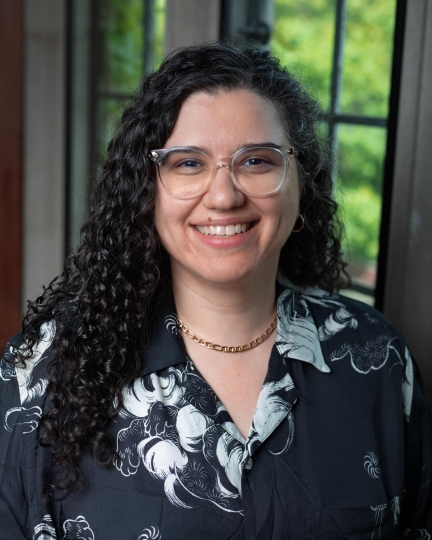Dima Ayoub
Dept. Chair/Associate Professor of Arabic

- Office
- Voter Hall 008
- Tel
- (802) 443-5653
- dayoub@middlebury.edu
- Office Hours
- FALL 2025: Tuesdays 3:30-4:30, Wednesdays 6:30-7:30, Fridays on Zoom 1:00-2:00PM. Please email to set up a meeting.
Dima Ayoub, Ph.D. (McGill University) is an Associate Professor of Arabic and former C.V. Starr Junior Faculty Fellow in International Studies and the former director of the Middle East studies program. Her book manuscript Paratext and Power: Modern Arabic Literature in Translation examines the post-war evolution and formation of Modern Arabic literature by examining the various networks, institutions and discourses developed in the mid-century and the central role of translation and paratexts that make the field what it is today. Additionally, Ayoub’s work connects the fields of digital humanities, Arabic, and comparative literature – she developed a digital archive of paratexts that accompany translations of modern Arabic literature in English, French, German, and Spanish. To learn more about the project go here. To learn more about her work with Middlebury students go here. During the Spring 2024 semester, she was a Visiting Faculty Fellow at the Neubauer Collegium at the University of Chicago.
Areas of teaching/expertise: modern Arabic literature; translation studies; Digital Humanities; Anglo-Arab literature; Arab-American literature; Arab cinema; postcolonial Studies; postmodern literature; gender studies, Arab feminism(s); Arab-Jewish literature and culture.
Publications
2021 “Multilingual Others: Transliteration as Resistant Translation.” Multilingual Literature as World Literature. Edited by Wen-Chin Ouyang and Jane Hiddleston. London: Bloomsbury, 2021.
2020 Ayoub, Dima. “Politics of Paratextuality: The Glossary Between Translation and the Translational.” Journal of Arabic Literature. 51.1 (2020): 27-52.
2019 Ayoub, Dima. “Diasporic Slippages: Accent and Dialect in Translation.” Journal of Middle Eastern Literatures. 22.1 (2019): 23-35.
2019 Ayoub, Dima. “The (Un)Translatability of Translational Literature: Ahdaf Soueif’s The Map of Love between English and Arabic.” Translation Studies. 12.3 (2019): 308-320.
Recent Public & Invited Talks:
NYU Abu Dhabi Art Gallery Navigating Digital Identities, Translation, Bodies, and Paratexts [A conversation with Lee Blalock and Dima Ayoub] Duke University, Middle East Studies Center “What Can the Digital Humanities Learn from Arabic Literature in Translation?”
University of Maryland Baltimore County, Gender Women’s, + Sexuality Studies “Exploring Gender Ambiguity & Non-Conformity in Arabic.”
Hamad Bin Khalifa University, 11th International Translation Conference. Keynote address “Towards a Just Translation: COVID 19 and Current Changes in Translation and Interpreting Studies”
Association of Adaptation Studies Conference, Queen Margaret University Edinburgh, Edinburgh, Scotland. Keynote address: “Strangers in our Midst: The Paratextual Labor of Arabic Literature in Translation”
Select Papers and Presentations:
“Talking Gender: Fluidity, Pronouns, and the Arabic Language. Community Conversation. Lebanese American University New York City Head Quarters. New York City, NY. February 2020.
“Transliterating Right-to-Left Languages.” NYU Abu Dhabi Winter Institute in Digital Humanities, New York University, Abu Dhabi, United Arab Emirates. January 2020.
“Transliteration as Resistant Translation.” Abdelkébir Khatibi: Literature & Theory conference, Dartmouth College, Hanover, NH. November 2019.
“Lebanon Protests.” Public conversation with Tarek El Ariss and Paul Salem. Dartmouth College, Hanover, NH. November 2019.
“Paratext and Power in Arabic Literary Translation.” Forum Transregionale Studien, Europe in the Middle East—The Middle East in Europe (EUME), Berlin, Germany. July 2019.
“Glossary in Translation.” Seventeenth International Conference on New Directions in the Humanities. University of Granada, Granada, Spain. July 2019.
“Glossing the Glossary: Digital Approaches to Paratexts and Power in Arabic Literature.” The Cultural Turn in Arabic Literary Production, Conference in Celebration of the 50th Anniversary of the Journal of Arabic Literature, Columbia University, New York. April 2019.
“Digitizing Paratexts in Translation: Between Distant and Close Readings.” Histoire, langues et textométrie Colloque, Université Paris, Sorbonne, Paris. January 2019.
“Itinerant Paratexts in Translation.” Keynote lecture at Islamic Studies Within a Global Context Conference, Institute of Islamic Studies, McGill University, Montréal. April 2018.
